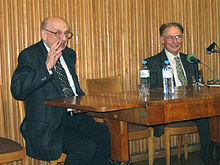Michał Głowiński

Michał Głowiński (born November 4, 1934 in Pruszków ) is a Polish literary scholar.
Life
Michał Głowiński was born in a Warsaw suburb into a family of assimilated Jews. After the German conquest of Poland, his family was imprisoned in a ghetto in Pruszków established by the Germans. From there they were transferred to the Warsaw ghetto . When the transports to the Treblinka extermination camp began in 1942 , they escaped selection with the help of a member of the Jewish ghetto police . In January 1943 they organized their escape from the ghetto and initially lived under a false identity in Warsaw. Głowiński's father was recruited into the German Reich for forced labor . His mother had to part with him too, in order not to endanger him, and had to deny him. He was brought to safety in an orphanage with Catholic nuns in Turkowice , Lublin Voivodeship , in eastern Poland . Głowiński was baptized there, and his parents also survived the Holocaust .
Głowiński studied Polish Philology at the University of Warsaw and graduated in 1955. From 1958 to 2004 he worked at the Institute for Literary Research of the Polish Academy of Sciences and became a professor there. From 1963 to 1983 he was a member of the Polish Writers' Association (ZLP) . In the summer of 1980 he supported Solidarność's call to strike .
Głowiński wrote a number of literary theoretical investigations and wrote articles as a literary critic. a. in the magazines Życie Literackie , Twórczość , Krytyka and Kulturze Niezależnej . In Czarne sezony (1998) he describes (autobiographically) the life of a child during the German occupation of Poland and the murder of European Jews.
Głowiński is a member of the Polish Academy of Sciences and the Polska Akademia Umiejętności .
Głowiński was awarded an honorary doctorate from the Adam Mickiewicz University in Poznan in 2001 and from the University of Opole in 2003 . In 2004 he received the Herder Prize from the Alfred Toepfer Foundation FVS, in 2007 he received the Gloria Artis Medal for cultural merit , and in 2013 he was awarded the Polonia Restituta Officer's Cross.
Fonts (selection)
- Poetyka Tuwima a polska tradycja literacka (1962)
- Porządek, chaos, znaczenie (1968)
- Powieść młodopolska (1969)
- Gry powieściowe (1973)
- Style odbioru (1977)
- Novomowa po polsku (1990)
-
Mity Przebrane (1990)
- Myths in disguise: Dionysus, Narcissus, Prometheus, Marchołt, Labyrinth . From the polish. by Jan Conrad. Frankfurt am Main: Suhrkamp, 2005
- Marcowe gadanie: Komentarze do słów. 1966-1971 (1991)
- Rytuał i demagogia. Trzynaście szkiców o sztuce zdegradowanej (1992)
- Peereliada. Komentarze do słów 1976-1981 (1993)
- Mowa w stanie oblężenia (1996)
- Czarne sezony (1998)
- Końcówka (1999)
-
Magdalenka z razowego chleba (2001)
- A Madeleine made of black bread , From the Polish. by Martin Pollack . Frankfurt am Main: Jüdischer Verlag, 2003
- Gombrowicz i nadliteratura (2002)
- Historia jednej topoli (2003)
- Skrzydła i pięta (2004)
- Ironia (2005)
- Kładka nad czasem (2006)
- Monologue wewnętrzny Telimeny i inne szkice (2007)
- Fabuły przerwane: Małe szkice 1998-2007 (2008)
- Kręgi obcości (2010)
- The peculiarities of the anti-Semitic discourse . In: Anna Wolff-Powęska (Ed.): The Holocaust in the Polish culture of remembrance . Lang, Frankfurt am Main 2012
Web links
- Literature by and about Michał Głowiński in the catalog of the German National Library
- Literature by and about Michał Głowiński in the WorldCat bibliographic database
- Short biography and reviews of works by Michał Głowiński at perlentaucher.de
Individual evidence
- ^ A b c Gilbert C. Rappaport (University of Texas at Austin): Review of Czarne sezony . ( Memento of the original from April 17, 2014 in the Internet Archive ) Info: The archive link was inserted automatically and has not yet been checked. Please check the original and archive link according to the instructions and then remove this notice. (PDF) In: Jews in the Polish Borderlands , Polin: A Journal of Polish-Jewish Studies 2001 (English).
- ↑ a b c d Anna Grażyna Kister: Michał Głowiński . In: Encyklopedia Solidarności (Polish).
| personal data | |
|---|---|
| SURNAME | Głowiński, Michał |
| BRIEF DESCRIPTION | Polish literary scholar |
| DATE OF BIRTH | November 4, 1934 |
| PLACE OF BIRTH | Pruszków |